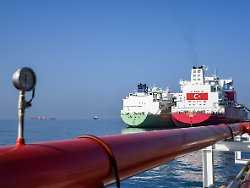Floating LNG terminals
Special ships are to replace Russian gas
By Christina Lohner
04/05/2022, 7:17 p.m
It will be years before Germany’s liquid gas terminals are ready. The temporary solution: floating platforms. Lithuania, for example, has already made itself independent of Russian gas.
As the first EU country, Lithuania has been independent of Russian gas since the weekend. All demand will now be imported via the floating LNG terminal, which Lithuania has been using for years, the government proudly announced. France already has four stationary LNG terminals and is now apparently negotiating with Totalenergies about the construction of a floating plant in Le Havre. In Germany, Hamburg has raised its finger for a floating terminal. And Wilhelmshaven is also applying for the import of liquid gas – in a first step via a so-called “Floating Storage and Regasification Unit” (FSRU).
As this English technical term for the terminals suggests, liquid gas is taken from tankers on such special ships, temporarily stored and made gaseous again. LNG is refrigerated natural gas liquefied under high pressure that can be transported by ship, providing an alternative to pipeline gas. The gas is piped from LNG terminals to the nearest large pipeline.
In order to also become independent of Russian gas, Germany is now planning two stationary LNG terminals, which should cover up to 20 percent of local gas consumption. In the future, Germany will also be able to import liquefied gas from the USA and Qatar. So far, such terminals have not been financially worthwhile, but Russia’s attack on Ukraine not only changed prices, but also political will. However, the construction of the terminals will take years, at least until 2024.
Economics Minister Robert Habeck is now considering floating LNG terminals as an interim solution. The federal government is working on putting several such special ships into operation in Germany this year and next. The energy companies RWE and Uniper secured an option for three floating terminals on their behalf.
48 floating terminals worldwide
The mobile terminals are currently in demand. Christian Breuel from the Schulte Group, a Hamburg shipping company with many years of experience in the management of LNG tankers, is nevertheless “optimistic that such a special ship will be operational in Germany before the start of next winter,” as he told the “Handelsblatt”. There are 48 FSRUs worldwide, some of which can be chartered at short notice. It is a “temporary solution that can be installed quickly”. The shipping company refers to Lithuania.
The floating terminals should remain an interim solution because they need significantly more energy and thus emit more CO2 and are more expensive than stationary ones, as the spokesman for the Zukunft Gas association explains to ntv.de. This is because gas burners would be used on floating terminals to heat the gas to liquefy it again; in the case of stationary systems, on the other hand, waste heat from industrial plants can be used.
Because of the necessary infrastructure, Russian gas is much more difficult to replace than oil and coal. According to the Ministry of Economic Affairs, Germany has already reduced its share of gas from Russia from 55 to 40 percent. Habeck believes it is realistic to become almost completely independent of Russia by the summer of 2024 – depending on how much consumption is reduced and how quickly renewable energies are expanded.
Habeck’s party friend Ulf Berner, chairman of the Greens in Wilhelmshaven’s city council, is not quite as enthusiastic about the idea of special ships in his city: “LNG is highly critical for us because it’s also about fracking gas, which is underground in terms of extraction and profitability.” , he told Deutschlandfunk Kultur. “We could also burn coal there.” If federal politicians set a date for phasing out or switching to biogas, bio-LNG, so to speak, one could “possibly swallow the toad”. Lower Saxony’s Environment and Energy Minister Olaf Lies from the SPD promised: “The path that we are now creating, via the terminals, is a path that gives us the option of importing ‘green gas’ tomorrow via this same import.”
